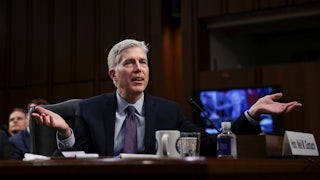Ohio Republicans will finish duking it out in their bruising and heavily covered primary for Senate next Tuesday. But what about the Democratic side? Whoever emerges from the GOP primary will almost certainly face Congressman Tim Ryan in the general election. Ryan’s bet is that the best way for a Democrat to win in the increasingly conservative Ohio is to focus on economic populism.
In a short but wide-ranging interview, Ryan argued that his approach offers a stark contrast to Republicans’ focus in their primary on copying Donald Trump’s bombastic style. The candidates, notably Josh Mandel and J.D. Vance, have been feuding over the degrees to which they support Trump and whom Trump favors the most.
“One thing I could assure you, there’s going to be very, very clear contrast,” Ryan said. “My vision is, how do we bring people together? How do we build the state up? How do we rebuild the great American middle class and focus on the economic issues—working with American companies and American workers to do that? That’s going to be the clear difference, while the other side is in a very dark place, consistently punching down—basically a view of the world that’s about culture wars and division and would wake up the day after the election, if they won, and want to punish 50 percent of the people in the state and country for not voting for them.”
Ryan framed the Republican primary
as having gotten out of hand and strayed too far from the bread-and-butter
issues Ohio voters will respond to. “I think people are exhausted with the
Republican primary,” Ryan said. “Politicians on the other side are having these
huge culture wars, and so I think there’s a huge opening right now for a blue-collar
candidate who’s from Ohio that is solely businesses and building the Ohio
middle class. And I think that’s going to make the difference.”
And he emphasized his authenticity as a native of Youngstown—an archetypal struggling Rust Belt city. “Who’s more Ohio here? I’m not going to Mar-a-Lago. I’m not going to San Francisco. I’m not going to New York to kiss anyone’s rear end. I’m going to go to Ohio,” Ryan said.
Ryan is apparently going to cruise in the four-person Democratic primary, but his race hasn’t gone without bumps. His first campaign ad focused on China taking American jobs. That ad sparked criticism in some Democratic circles that it used the same kind of anti-Asian rhetoric flowing through the right wing of the GOP. New York Congresswoman Grace Meng, who is Taiwanese-American, urged Ryan to tone it down. But Ryan did not. In the ad, Ryan says: “One word: China. It is us versus China.”
The ad does fit into Ryan’s larger thesis on how to win in Ohio. Ryan, in the interview, framed his opponents as extremists who are loyal only to Trump and are willing to oppose anything that isn’t associated with him. He pointed to the Biden administration’s infrastructure bill, which, Ryan noted, was pushed along by retiring Senator Rob Portman, the Republican whose seat the congressman is vying for. He said essentially any of the candidates whom he could face in the general election were against that bill.
“If you’re not for a bipartisan infrastructure bill to bring broadband to many places in Ohio that was written by the Republican senator in Ohio, you are an extremist. You’re a radical. There’s no other way to put it,” Ryan said.
Ryan is also willing, in this state that backed Trump twice pretty handily, to point to moments when he backed something Trump was doing while in office, even though he says the GOP’s base has gone too far to the right. “What I tell people is ‘Look, when Trump was tough on China, I supported him. When Trump renegotiated Nafta, I supported him. When Trump put in his defense budget the Space Force, I supported it,’” Ryan said.
/ In honor of Earth Day, TNR’s climate coverage is free to registered users until April 29. Start reading now.
Ryan also pointed to moments when he tussled with members of his own party, for instance when he was part of the small bunch of lawmakers who organized a quixotic move to fight Nancy Pelosi becoming House speaker or when he disagreed with President Obama on the Trans-Pacific Partnership.
Ryan’s big problem is this: Winning in Ohio has become a long shot for Democrats in recent years. True, there’s Senator Sherrod Brown, a Democrat liked by both the centrist and progressive wings of the Democratic Party, who won reelection to his third term in 2018. Brown won 16 out of the state’s 88 counties—the three big cities, the many smaller cities, and a few with universities and colleges. Brown himself has noted that that was a steep decline from 2006 when he beat Mike DeWine, who is now the governor, and won 50 of 88 counties. That’s a telling marker of how red the state has become and how narrow is the needle that a statewide Democrat must thread.
On the GOP side, Trump’s decision to endorse J.D. Vance has further scrambled the seven-candidate primary and surfaced ongoing tensions within the Republican Party. But depending on the poll you’re looking at, the front-runner is either Vance or Mandel, the former state treasurer. There isn’t much general election matchup polling available, and some Democrats in Ohio are unsure which candidate would fare worse against Ryan. A few recent polls show Ryan trailing Mandel in a head-to-head matchup by just a few points. But Ryan leads by a few points in other polls against Vance or former Ohio Republican Party Chairwoman Jane Timken. Another candidate, businessman Mike Gibbons, polls competitively in the primary field, but there’s no polling on him versus Ryan.
Democrats are viewing the Ohio Senate race in a similar way to the state’s governor’s race. In both races, although there are plenty of differences, Republicans are having to deal with heated internal battles where Trump’s support looms large. Officials at the Democratic Governors Association have argued that the feuding between incumbent Governor DeWine and former Congressman Jim Renacci, DeWine’s conservative challenger in the primary, creates an opening for whoever emerges from the Democratic primary—either former Dayton Mayor Nan Whaley or former Cincinnati Mayor John Cranley.
Still, Ohio has been trending in an unfavorable direction for Democrats in recent years. Trump beat Joe Biden in Ohio by eight percentage points in 2020. In 2016, Trump won Ohio by about the same margin. An Emerson Polling survey of Ohio from February found that 40 percent of Ohioans approve of Biden’s job performance while 54 percent disapprove. When I asked Ryan whether it would be helpful for Biden to come campaign for him, he didn’t give a strong answer one way or the other.
“We’re not really asking any surrogates to come,” Ryan said. “This is my race, and I’m going to run it, and I’m going to run it, and I’m going to be the face of the campaign, and people are going to vote on me. Because sometimes I agree with Biden if he’s doing something good, and if he’s doing something I don’t necessarily agree with, I’ll disagree with him too.”
Ryan still has to win the Democratic primary for Senate. He faces activist Traci Johnson and Morgan Harper, a former senior adviser at the Consumer Financial Protection Bureau who has risen to minor prominence in national progressive circles. Ryan is undeniably the favorite in the primary—a position he won’t be in come the general.








